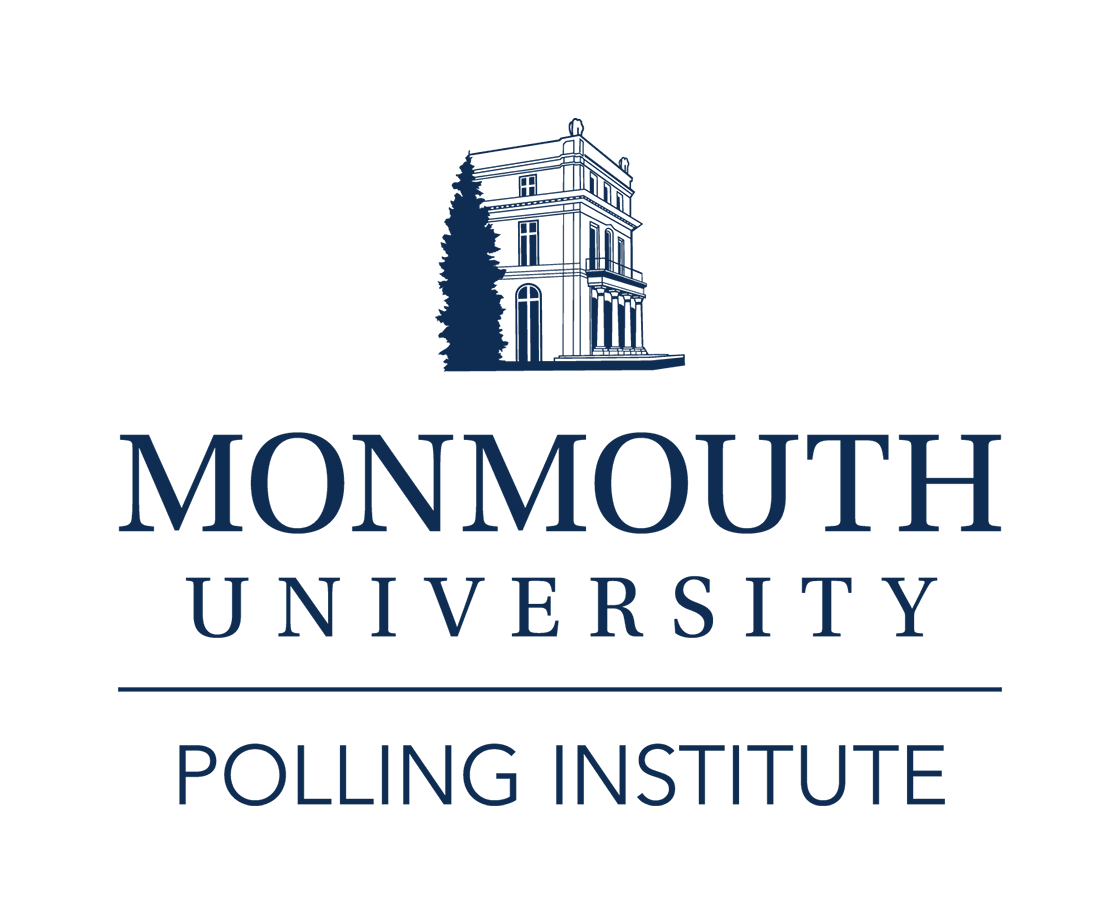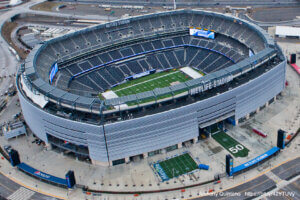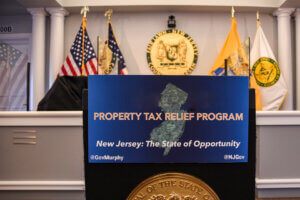A bare majority of New Jersey voters are aware that the state legislature is up for election in a few weeks, and fewer really care. The results of the latest Monmouth University/NJ Press Media Poll suggest that statewide opinion of the legislature as a whole will translate to very little change in the 40 district contests.
Just 33% of Garden State voters approve of the job their state legislature is doing while 45% disapprove. Another 22% have no opinion. These results are very similar to ratings of the legislature taken over the past year. Interestingly, Democrats are more likely to disapprove (52%) rather than approve (25%) of the legislature controlled by their own party. Republicans, on the other hand, are more likely to approve (49%) rather than disapprove (33%). This counter-intuitive partisan split has been seen in recent polling, but it is even more pronounced in the current poll. A Monmouth University/NJ Press Media Poll released last week found that Republicans are much more positive than Democrats about Governor Christie’s claims of Trenton bipartisanship and that appears to be reflected in their differing views of the legislature.
“Don’t be fooled into thinking that displeasure with the legislature is going to lead to a change election. Aside from the fact that the new legislative map protects nearly every incumbent, Democratic voters are actually more unhappy than Republicans, which may be due to how much the leadership has compromised with the governor. However, there is no indication they are willing to cross party lines in this election to express their dissatisfaction,” said Patrick Murray, director of the Monmouth University Polling Institute.
When asked which party’s candidates they would support in the upcoming election, 88% of Democrats said they would vote for Democrats to just 5% who would vote for the Republican slate or split their vote. Similarly, 83% of Republicans said they would vote the party line compared to 8% who would cross lines or split their vote. Independents are somewhat more likely to vote Republican (36%) rather than Democrat (27%).
When averaged together, 41% of New Jersey voters say they will vote Democratic, 36% will vote Republican, and 5% will split their vote. Among the most engaged group of voters – and thus the most likely to turn out on November 8 – 43% say they will vote Democratic, 37% will vote Republican, and 3% will split their vote.
Just over half (55%) of New Jersey voters reported already being aware of the legislative election when contacted by Monmouth University pollsters just a month before the November 8 ballot. Only 3-in-10 voters (30%) say they have a lot of interest in this election, including 31% of self-identified Republicans, 30% of Democrats, and 31% of independents. Another 34% of Garden State voters have some interest, 24% a little, and 12% none.
Barely half (49%) of New Jersey’s electorate say it matters a lot to them which party controls the legislature and another 26% say it matters a little. This breaks down to a 37% Democratic to 28% Republican preference for legislative leadership. Another 23% simply don’t care one way or the other.
Even among partisan voters, the percentage who say party control matters a lot to them is not particularly overwhelming, 63% for Democrats and 53% for Republicans. The number is higher, though, among the most engaged voters (70%).
“Voters may not be paying close attention but they inherently understand the consequences of the new legislative map. So it is pretty difficult to blame voters for not caring about something which they have little power to change,” said Murray.
The poll also found that New Jersey voters are not particularly well-informed about their legislature. Just 51% identified the Democrats as the party which currently holds the reins of power. Another 16% actually think the Republicans are in charge. Only 18% of Garden State voters can name at least one of their three incumbent legislators.
The Monmouth University/NJ Press Media Poll was conducted by telephone with 693 New Jersey registered voters from October 5 to 9, 2011. This sample has a margin of error of ± 3.7 percent. The poll was conducted by the Monmouth University Polling Institute and originally published by the NJ Press Media newspaper group (Asbury Park Press, Courier-Post, Courier News, Daily Journal, Daily Record, and Home News Tribune).
DATA TABLES
The questions referred to in this release are as follows:
(* Some columns may not add to 100% due to rounding.)
1. Do you approve or disapprove of the job the state legislature is doing?
|
TOTAL | PARTY ID | VOTER TYPE |
PUBLIC | ||||||||
|
Dem | Ind | Rep | Engaged | Indifferent | Apathetic | Yes |
No | ||||
| Approve | 33% | 25% | 34% | 49% | 32% | 40% | 26% | 28% | 35% | ||
| Disapprove | 45% | 52% | 47% | 33% | 55% | 41% | 41% | 55% | 42% | ||
| (VOL) Don’t know | 22% | 23% | 19% | 18% | 12% | 19% | 33% | 17% | 23% | ||
| TREND: Registered Voters | Oct. 2011 | Aug. 2011 | May 2011 | Feb. 2011 | July 2010 | April 2010 | Feb. 2010 | July 2009 | Feb. 2009 | Sept. 2008 | July 2008 | April 2008 | March 2008 | Oct. 2007 | Feb. 2007 |
| Approve | 33% | 35% | 32% | 29% | 25% | 19% | 24% | 31% | 23% | 29% | 27% | 28% | 25% | 32% | 34% |
| Disapprove | 45% | 48% | 48% | 45% | 49% | 57% | 49% | 48% | 55% | 50% | 47% | 55% | 53% | 43% | 42% |
| (VOL) Don’t know | 22% | 17% | 20% | 26% | 26% | 24% | 27% | 22% | 22% | 21% | 26% | 17% | 22% | 25% | 23% |
| Unwtd N | 693 | 730 | 725 | 718 | 747 | 719 | 716 | 792 | 721 | 709 | 889 | 720 | 719 | 688 | 681 |
2. Have you heard that there will be an election for New Jersey state legislature this November, or haven’t you heard this yet?
|
TOTAL | PARTY ID | VOTER TYPE |
PUBLIC | ||||||||
|
Dem | Ind | Rep | Engaged | Indifferent | Apathetic | Yes |
No | ||||
| Yes, have heard | 55% | 56% | 53% | 56% | 71% | 59% | 36% | 64% | 51% | ||
| No, have not heard | 45% | 43% | 46% | 44% | 28% | 41% | 64% | 36% | 48% | ||
| (VOL) Don’t know | 1% | 1% | 1% | 0% | 1% | 0% | 1% | 0% | 1% | ||
3. How much interest do you have in the upcoming election for state legislature – a lot, some, a little, or none at all?
|
TOTAL | PARTY ID | VOTER TYPE |
PUBLIC | ||||||||
|
Dem | Ind | Rep | Engaged | Indifferent | Apathetic | Yes |
No | ||||
| A lot | 30% | 30% | 31% | 31% | 100% | 0% | 0% | 44% | 25% | ||
| Some | 34% | 30% | 33% | 41% | 0% | 79% | 13% | 34% | 33% | ||
| A little | 24% | 26% | 24% | 20% | 0% | 21% | 51% | 16% | 28% | ||
| None at all | 12% | 14% | 12% | 6% | 0% | 0% | 35% | 6% | 14% | ||
| (VOL) Don’t know | 1% | 0% | 1% | 1% | 0% | 0% | 2% | 1% | 0% | ||
4. Not everyone is able to vote in each election. For the upcoming election this November, are you certain to vote, very likely to vote, are not sure, or don’t you think you will vote?
|
TOTAL | PARTY ID | VOTER TYPE |
PUBLIC | ||||||||
|
Dem | Ind | Rep | Engaged | Indifferent | Apathetic | Yes |
No | ||||
| Certain to vote | 52% | 50% | 51% | 60% | 83% | 65% | 8% | 59% | 49% | ||
| Very likely to vote | 26% | 22% | 27% | 29% | 17% | 35% | 25% | 26% | 26% | ||
| Not sure | 18% | 22% | 17% | 8% | 0% | 0% | 54% | 11% | 21% | ||
| Don’t think will vote | 4% | 5% | 4% | 2% | 0% | 0% | 12% | 3% | 5% | ||
| (VOL) Don’t know | 0% | 0% | 0% | 1% | 0% | 0% | 1% | 0% | 0% | ||
[The following question was asked only of people who were certain or very likely to vote: moe=+/-4.1%]
5. If the election were held today, would you vote for the Republican or Democratic candidates for state legislature in your district?
|
TOTAL | PARTY ID | VOTER TYPE |
PUBLIC | |||||||
|
Dem | Ind | Rep | Engaged | Indifferent | Apathetic | Yes |
No | |||
| Republican | 36% | 3% | 36% | 83% | 37% | 37% | 30% | 26% | 40% | |
| Democratic | 41% | 88% | 27% | 3% | 43% | 39% | 39% | 46% | 38% | |
| (VOL) Split, some Democrat and some Republican | 5% | 2% | 7% | 5% | 3% | 6% | 10% | 5% | 5% | |
| (VOL) Other, independent | 3% | 2% | 6% | 0% | 3% | 3% | 5% | 3% | 4% | |
| (VOL) Don’t know | 15% | 4% | 24% | 8% | 15% | 15% | 17% | 19% | 13% | |
6. How much does it matter to you which party controls the state legislature – a lot, a little, or not at all?
|
TOTAL | PARTY ID | VOTER TYPE |
PUBLIC WORKER | |||||||
|
Dem | Ind | Rep | Engaged | Indifferent | Apathetic | Yes |
No | |||
| A lot | 49% | 63% | 40% | 53% | 70% | 42% | 39% | 55% | 48% | |
| A little | 26% | 19% | 28% | 33% | 13% | 33% | 29% | 21% | 28% | |
| Not at all | 23% | 17% | 30% | 12% | 14% | 23% | 31% | 22% | 23% | |
| (VOL) Don’t know | 2% | 0% | 3% | 1% | 3% | 2% | 0% | 2% | 1% | |
7. Would you prefer that the Republicans or the Democrats control the legislature?
|
TOTAL | PARTY ID | VOTER TYPE |
PUBLIC | ||||||||
|
Dem | Ind | Rep | Engaged | Indifferent | Apathetic | Yes |
No | ||||
| Republicans | 28% | 3% | 28% | 74% | 33% | 32% | 19% | 21% | 31% | ||
| Democrats | 37% | 77% | 23% | 5% | 43% | 33% | 36% | 43% | 35% | ||
| (VOL) Other, independent | 3% | 0% | 5% | 3% | 2% | 3% | 3% | 3% | 3% | ||
| (VOL) Don’t know | 8% | 2% | 11% | 5% | 4% | 7% | 11% | 9% | 7% | ||
| Does not matter (from Q6) | 25% | 18% | 32% | 13% | 18% | 25% | 31% | 24% | 24% | ||
8. Do you happen to know whether the Democrats or the Republicans currently control the state legislature?
|
TOTAL | PARTY ID | VOTER TYPE |
PUBLIC | ||||||||
|
Dem | Ind | Rep | Engaged | Indifferent | Apathetic | Yes |
No | ||||
| Democrats | 51% | 42% | 56% | 64% | 66% | 54% | 36% | 59% | 49% | ||
| Republicans | 16% | 19% | 17% | 8% | 13% | 18% | 16% | 19% | 15% | ||
| (VOL) Split | 1% | 1% | 0% | 3% | 1% | 1% | 2% | 1% | 2% | ||
| No, don’t know | 30% | 37% | 26% | 20% | 20% | 24% | 46% | 21% | 33% | ||
| (VOL) Don’t know | 1% | 2% | 0% | 4% | 0% | 3% | 1% | 0% | 2% | ||
9. Can you name any of your current state legislators?
TOTAL | PARTY ID | VOTER TYPE | PUBLIC | ||||||||
|
Dem | Ind | Rep | Engaged | Indifferent | Apathetic | Yes | No | ||||
| Gives at least one correct name | 18% | 14% | 19% | 24% | 32% | 17% | 5% | 28% | 14% | ||
| Names Congress member | 9% | 6% | 11% | 10% | 10% | 11% | 6% | 10% | 8% | ||
| Other name given | 2% | 2% | 2% | 1% | 2% | 4% | 0% | 2% | 2% | ||
| Offers no names | 68% | 74% | 65% | 63% | 52% | 65% | 84% | 56% | 72% | ||
| No answer | 4% | 5% | 3% | 2% | 4% | 3% | 4% | 4% | 4% | ||
The Monmouth University/NJ Press Media Poll was conducted by the Monmouth University Polling Institute on October 5 to 9, 2011 with a statewide random sample of 693 registered voters, including 612 contacted on a landline telephone and 81 on a cell phone. Sampling and interviewing services were provided by Braun Research, Inc. For results based on the total sample, one can say with 95% confidence that the error attributable to sampling has a maximum margin of plus or minus 3.7 percentage points. Sampling error increases as the sample size decreases, so statements based on various population subgroups, such as separate figures reported by gender or party identification, are subject to more error than are statements based on the total sample. In addition to sampling error, one should bear in mind that question wording and practical difficulties in conducting surveys can introduce error or bias into the findings of opinion polls.
POLL DEMOGRAPHICS | |||
Registered Voter Sample (weighted) | |||
| 34% Dem | 47% Male | 21% 18-34 | 67% White |
| 20% Rep | 53% Female | 42% 35-54 | 11% Black |
| 46% Ind | 37% 55+ | 15% Hispanic | |
7% Asian/Other | |||
It is the Monmouth University Polling Institute’s policy to conduct surveys of all adult New Jersey residents, including voters and non-voters, on issues that affect the state. Specific voter surveys are conducted when appropriate during election cycles.
Click on pdf file link below for full methodology and results by key demographic groups.




